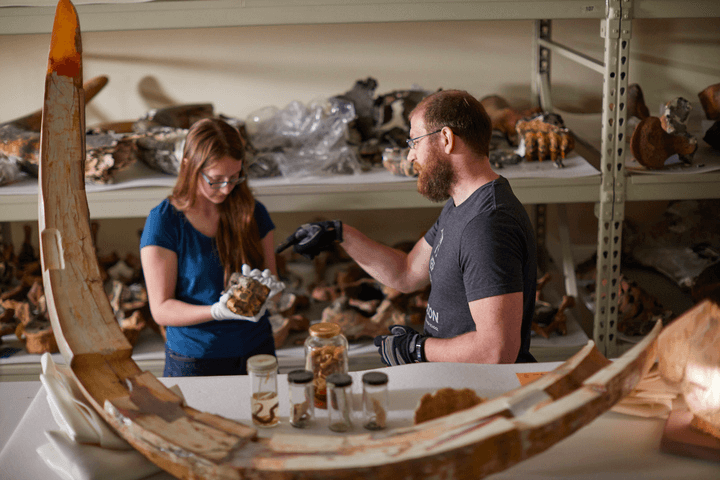This article written by Edward Montalvo and published by XQ on April 28 2023.
You know that face students make when you ask them questions, and you can tell they’re thinking deeply? It’s a very distinctive face: their eyes are growing bigger, and you can tell the dots are connecting. If you’re an educator, it’s the moment that feeds your soul and reminds you why you’re doing this work.
I’m calling attention to these sporadic moments because we educators often focus solely on a student’s rightfully-earned success. Teacher Appreciation Week is a special time to honor and celebrate all the preparation and important work it takes to get students to that higher level of thinking.
In the United States, we dedicate the first week of May to Teacher Appreciation by recognizing the tireless dedication of our teachers—those who play a vital role in shaping the minds and character of younger generations, millions of students each day, with compassion and expertise. But sometimes, we unknowingly forget that teachers are also mentors, community members, strangers in passing, and parents and family members themselves.
Why Teacher Appreciation Week Is Important
A teacher’s job isn’t easy. But the difficulties and stresses have grown over time—and perhaps especially in recent years due to the pandemic and political strife. Educator-focused organizations are taking on issues like teacher burnout, even as many teachers express their determination to continue working in their schools, no matter how many challenges they need to surmount. Numerous outlets have reported on the causes of teacher burnout and what can be done to address it.
While a small step, one way everyone can help support and respect teachers and the teaching profession is to identify how they can participate and celebrate in educator-focused events like Teacher Appreciation Week. The origins of Teacher Appreciation Week can be traced back to 1953 when Eleanor Roosevelt persuaded Congress to proclaim a National Teacher Day. Fast forward to 1984, when the National Parent Teacher Association designated the entire first week of May as Teacher Appreciation Week to recognize the hard work and honor the dedication of teachers in shaping our world’s future.
Respecting and appreciating our educators can have positive ripple effects on schools, including a more engaged teacher workforce with better student outcomes. Teachers who feel trusted, empowered, and recognized for their work are more likely to remain in the profession–creating a valuable knowledge bank of experience and wisdom to help support schools and new teacher training programs.
Efforts to empower educators in the classroom give them space to focus more on teaching and creating a student-centered classroom. In a student-centered classroom, educators can bring forward authentic learning experiences and create meaningful connections with their students. At XQ, we’ve identified meaningful, engaged learning and caring, trusting relationships as two of our six XQ Design Principles, a tool that can help guide schools to create a model where exciting, rigorous teaching and learning happens.
Moreover, it’s important to note that we shouldn’t limit ourselves to one week at the end of the school year when appreciating teachers. Recognizing and respecting the hard work of educators should be consistent, individualized, and delivered by numerous stakeholders.

The Role of Teachers in Society
Teachers have a critical role in shaping the minds and characters of the next generation, instilling values that will shape our society for years to come. Public school teachers, in particular, play a vital role in ensuring equal access to education for all, with substantial opportunities for further economic growth and development.
Research shows that a strong and respected educator workforce has significant economic benefits. The World Economic Forum found that investing in education and educators can lead to increased economic growth, higher wages, and reduced income inequality. Additionally, a high-quality education system can attract businesses and increase productivity.
For high schools specifically, further investments into the training, development, and retention of educators can lead to the sustained growth of a school and higher graduation rates. Increased graduation rates lead to economic growth for students, their communities, and the workforce at large. By respecting and supporting our educators, we can help to create a stronger and more prosperous society for all.
Despite their critical role, teachers are often undervalued and underpaid compared to professions with similar levels of post-secondary education. A stressed teaching workforce will only result in exacerbating existing educational inequalities. As states and districts identify how they will individually deal with the complexities of teacher compensation, communities can still recognize the important contributions teachers make to our society as we do with other essential workforces.
How We Can Show Respect For Teachers During Teacher Appreciation Week—And Any Week Of The Year
There are many ways to show respect for teachers, both as individuals and as professionals. One way is to recognize the value of the teaching profession and advocate for increased access to personal and professional learning resources to support schools with system changes and improvements. The science of teaching and learning highlights that teacher education, training, and greater access to student support services lead to positive outcomes for educators and student learning.
Another way to show respect is to make an effort to show individual teachers kindness, respect, and gratitude. This can include writing a thank-you note, offering words of encouragement, or simply listening to their concerns. Small acts of kindness can make a big difference in the lives of teachers and show them that their work is valued.
By supporting teachers’ expertise and showing our appreciation for their hard work, we can help to create a positive learning environment for students and ensure that our children receive the education they deserve. Respect is not only essential for creating a positive learning environment but also for supporting teachers’ well-being. Teachers who feel respected and valued are more likely to experience job satisfaction and less likely to leave the profession due to issues such as teacher burnout.
A positive work environment can help support teachers’ mental health and well-being, thus creating a more stable and consistent environment that fosters student learning. This can include providing opportunities for professional development that are relevant and grounded in the research teachers know to be effective. Further, giving teachers the autonomy to make classrooms their own helps to create a space that supports the individual needs of their students.
Increasing teacher autonomy means:
- Allowing teachers to increase flexible learning opportunities to support student learning.
- Identifying which curriculum promotes gains in student learning outcomes based on individualized data and student work.
- Incorporating differentiated instruction styles to support student diversity—neurologically and culturally.
- Creating an individualized space that fosters student safety, critical thinking, and creativity.
- Determining which, when, and how professional development can help to support teachers’ classroom instruction goals.
By showing that we recognize teacher expertise and contributions, we can help to ensure that teachers continue to feel motivated and engaged in their work, which in turn leads to better outcomes for students.
Teachers have been asked to expand their roles beyond content instruction, helping students learn how to navigate complex social environments, regulate emotions, and build inquiry-driving skills. As technology rapidly advances, teachers have also been asked to not only keep up but also innovate at a moment’s notice to better support students. As a society, we must recognize the vital role of teachers in shaping our future and show them the respect and appreciation they deserve. By doing so, we can create a positive learning environment that supports the well-being of both teachers and students.
During Teacher Appreciation Week, let’s take this opportunity to reflect on the vital role of teachers in our society and show them the respect and appreciation they deserve. By advocating for respectful and equitable working conditions, treating teachers with kindness and respect, and recognizing the contributions that teachers make to our society, we can help to create a better future for all.

Resources
In addition to highlighting the importance of teacher support and recognition during Teacher Appreciation Week, we’ve outlined additional resources to learn more about teacher appreciation, professional development opportunities for teachers, as well as other helpful tips and resources for teacher wellness and self-care.
- The Support Groups That Should Be On Every Teacher’s Radar highlights teacher challenges and introduces numerous support groups. It recommends resources and emphasizes the importance of a supportive community for teachers seeking encouragement.
- The National Educators Association (NEA) provides numerous professional learning resources for teachers. It includes webinars, micro-credentials, and other training opportunities on topics such as classroom management, assessment, and instructional strategies.
- The American Federation of Teachers recognizes Teacher Appreciation Week and offers resources to appreciate and support teachers, including sharing stories, advocating for teacher rights, and highlighting the importance of education.
- Edutopia provides a plethora of material for teacher wellness—offering articles and resources on mindfulness, self-care, stress reduction, and promoting teacher wellness to enhance student success.
Photo at top, Fiona Wong of Círculos. Photo by Gari Askew.